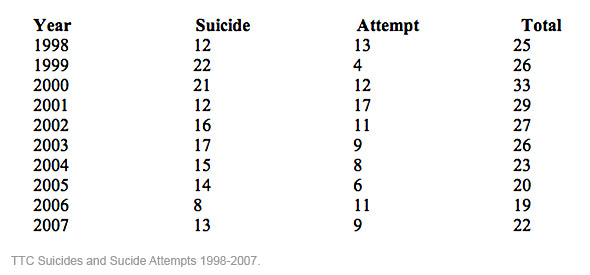
TTC Releases Suicide Statistics
The TTC has recently released statistics pertaining to suicides and suicide attempts involving Toronto subways. The information, which has long been kept confidential, was requested under the Municipal Freedom of Information and Protection of Privacy Act.
Although the mainstream media has previously resisted reporting on such incidents, this request was made by what the TTC refers to as "a local media outlet." Initially denied on account of fear that the publication of this information might lead to copy cat acts, the request was won on appeal and the Information and Privacy Commissioner ordered the information be made public.
In compliance with the order, the TTC has specifically released statistics that chart incidents of suicides and attempts between 1998-2007. Formerly the subject of much speculation and urban mythologizing, the numbers are sobering. On average, there has been a suicide attempt every two weeks over this period, with more than half of them successful.

That's certainly more than I would have estimated, and I understand the desire to keep this information under wraps. Forgetting the fact that there is evidence to suggest that reporting of incidents of this nature can pose difficulties for those who are already at high-risk for an attempt on their lives, there's a compelling argument to be made that these statistics may incite fear in the average rider.
With this information now public, the TTC is thus taking steps to highlight the preventive measures that it takes in regard to suicide attempts. Over the past decade or so, the Commission has worked with St. Michael's Hospital and the Trillium Health Centre on a number of initiatives to help prevent suicide attempts on subway property. Most notable is the "Gatekeeper Program," in which employees are trained to identify those who are exhibiting high-risk behaviour and how to best interact with them should they encounter distressed individuals on or near platforms.
What's so unfortunate about situations of this nature, however, is that it's extremely difficult to bring trains to a halt with any haste, and there just aren't enough staff to monitor every passenger's behaviour for signs warning of a possible jump onto the tracks.
For those employees who suffer the misfortune of being involved in such incidents, the TTC also offers a number of counseling programs oriented around acute psychological trauma. With roughly 25 attempts a year, this is no doubt a serious problem for subway drivers.
So, despite this release of information, the TTC will maintain its current policy of not informing the media of suicide attempts when they occur.
The forced release of the statistics has spawned feverish debate, with some people lauding the Toronto Sun for doing the digging, others condemning the media for revealing the numbers, and others playing devil's advocate.
What's your take? Should these numbers have been kept from the public? Is the contagion effect a concern here? What do we now do with these numbers? Are barriers on platforms the next step?
Photo by sjgardiner, member of the blogTO Flickr pool.
Latest Videos
Latest Videos
Join the conversation Load comments







